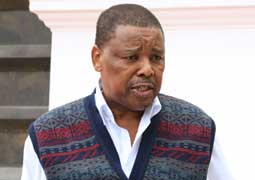
A new element of the State of the Nation Address (Sona) since the birth of democracy is Imbongi, the praise singer. He or she is regarded as a scene-setter and has become the mainstay of successive State of the Nation Addresses. Although our Parliament is based on the Westminster tradition, Imbongi has ensured that the event is an African event in an African Parliament. The praise singing gives Africanness a pride of place.
Imbongi occupies a special place in African culture as someone who recounts the historic moments of the nation, who reminds the nation how far it has come and where it is going. Imbongi is a living heritage and the archive of the nation. It is a spontaneous memory of successive royal lineages, praise and clan names and of the nation’s defining moments. This is often coupled with magnificent traditional wear that proclaims cultural identity and heritage.
Imbongi is the curtain-raiser of a significant moment of the nation, thus setting the mood by capturing its collective sentiments with poetic fervour. It utilises this skill to master the immense amount of knowledge and oration, in this case about the country and the President. Its duty is to inject the President with a great sense of pride by narrating his personal history, his clan and his family lineage in song, dance and narration. It does this with great accuracy that often fills the President with delight and surprise. This is often the task that illustrates the great intellectual capability needed for one to assume the enviable role of Imbongi.
A veteran praise singer, Mr Jongela Singatha Nojozi, has been selected to praise the brand-new President of the Republic of South Africa, Mr Cyril Ramaphosa, before he delivers the 2018 State of the Nation Address in the National Assembly before the joint sitting of the National Assembly and the National Council of Provinces.
Asked by Parliamentary Communication Officers at Parliament early today about how is he feeling about being selected to sing praises to President Ramaphosa, Mr Nojozi said whenever he is asked to praise the leader of the Republic of South Africa, he feels overwhelmed by the selection and quickly listens to his ancestors as he regards praise singing as a calling from his ancestors. He said he felt the praise singing calling when he was at primary school level in the late 60s in Krwakrwa village, his place of birth near Alice in the Eastern Cape.
“When I heard the news about my selection I felt honoured to be selected among many extraordinary praise singers. I listened to my ancestors who empower me in my praise singing work,” said Mr Nojozi.
He said he started praise singing at an early age when he was at primary school where he said he would give praises to a visiting inspector of education. “Over time and progressively more matured and advanced in the craft of praise singing, I became an official praise singer (Imbongi) for the Chief of my tribe – the late Chief Justice Mabandla. Later on I was elevated to be the official praise singer for the late King Sandile of the Rharhabe Kingdom,” said Mr Nojozi.
He also said he had the opportunity to sing praises to the likes of the late Mr Lennox Sebe and the late Chief Daliwonga Matanzima and that ultimately led him to being invited to sing praises to the late former President Rholihlahla Mandela, former President Thabo Mbeki and former President Jacob Zuma. “Praise singing is my life and it continues to be – as it gives me an opportunity, albeit in a small way, to make a contribution to my motherland,” said Mr Nojozi.
By Mava Lukani
16 February 2018

